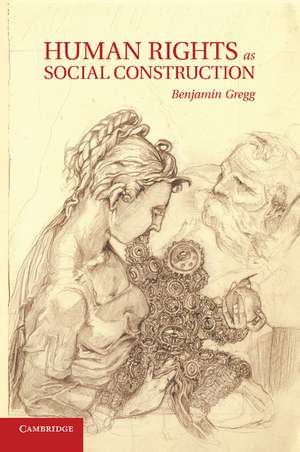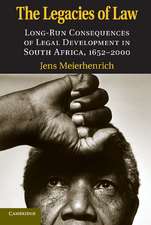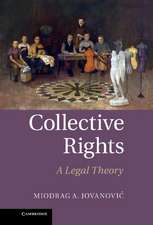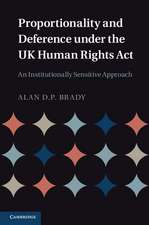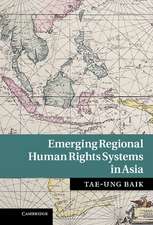Human Rights as Social Construction
Autor Benjamin Greggen Limba Engleză Paperback – 31 iul 2013
| Toate formatele și edițiile | Preț | Express |
|---|---|---|
| Paperback (1) | 284.17 lei 6-8 săpt. | |
| Cambridge University Press – 31 iul 2013 | 284.17 lei 6-8 săpt. | |
| Hardback (1) | 681.62 lei 6-8 săpt. | |
| Cambridge University Press – 11 dec 2011 | 681.62 lei 6-8 săpt. |
Preț: 284.17 lei
Nou
Puncte Express: 426
Preț estimativ în valută:
54.38€ • 58.15$ • 45.34£
54.38€ • 58.15$ • 45.34£
Carte tipărită la comandă
Livrare economică 17 aprilie-01 mai
Preluare comenzi: 021 569.72.76
Specificații
ISBN-13: 9781107612945
ISBN-10: 1107612942
Pagini: 272
Ilustrații: black & white illustrations
Dimensiuni: 152 x 229 x 14 mm
Greutate: 0.37 kg
Editura: Cambridge University Press
Colecția Cambridge University Press
Locul publicării:New York, United States
ISBN-10: 1107612942
Pagini: 272
Ilustrații: black & white illustrations
Dimensiuni: 152 x 229 x 14 mm
Greutate: 0.37 kg
Editura: Cambridge University Press
Colecția Cambridge University Press
Locul publicării:New York, United States
Cuprins
Part I. This-Worldly Norms, Local Not Universal: 1. Human rights: political not theological; 2. Human rights: political not metaphysical; 3. Generating universal human rights out of local norms; Part II. This-Worldly Resources for Human Rights as Social Construction: 4. Cultural resources: individuals as authors of human rights; 5. Neurobiological resources: emotions and natural altruism in support of human rights; Part III. This-Worldly Means of Advancing the Human-Rights Idea: 6. Translating human rights into local cultural vernaculars; 7. Advancing human rights through cognitive re-framing; Part IV. Human Rights, Future Tense: Human Nature and Political Community Reconceived: 8. Human rights via human nature as cultural choice; 9. The human-rights state; Part V. Coda: 10. What is lost, and what gained, by human rights as social construction.
Recenzii
'Benjamin Gregg's book advances an idea of the local and particular that, while normatively rich, invites an openness to universal norms as well. While denying any easy answers to the moral universalist, the argument is well placed to fend off many of the familiar skeptical objections to the idea of human rights. Professor Gregg writes with urgency and clarity, and his book should be read by both cosmopolitans and their critics.' Richard Vernon, Distinguished University Professor, University of Western Ontario
'In a lively style, Gregg engages a topic both familiar and urgent: the status of human rights. Gregg shows why the traditional question about human rights - are they universal, or local and parochial - is misplaced. Rights are both. To be actual, they must be worked out and justified locally. But their local force requires that there be something universal about them. With verve and conviction, Gregg shows how the 'human rights state' is a workable ideal.' Russell Muirhead, Robert Clements Associate Professor of Democracy and Politics, Dartmouth College
'Benjamin Gregg's brilliantly reasoned, strikingly original, and profoundly challenging approach to human rights theory and practice may be the most significant contribution on this theme in the last decade. It deserves the widest possible reading and debate.' Richard A. Falk, Professor Emeritus of International Law and Practice, Princeton University
'In a lively style, Gregg engages a topic both familiar and urgent: the status of human rights. Gregg shows why the traditional question about human rights - are they universal, or local and parochial - is misplaced. Rights are both. To be actual, they must be worked out and justified locally. But their local force requires that there be something universal about them. With verve and conviction, Gregg shows how the 'human rights state' is a workable ideal.' Russell Muirhead, Robert Clements Associate Professor of Democracy and Politics, Dartmouth College
'Benjamin Gregg's brilliantly reasoned, strikingly original, and profoundly challenging approach to human rights theory and practice may be the most significant contribution on this theme in the last decade. It deserves the widest possible reading and debate.' Richard A. Falk, Professor Emeritus of International Law and Practice, Princeton University
Notă biografică
Descriere
Benjamin Gregg believes human rights can be created by the ordinary people whom they address and are valid only if embraced by those to whom they apply.
